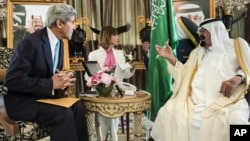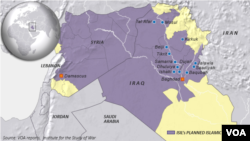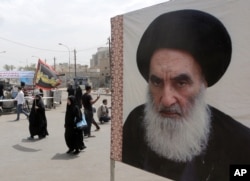U.S. Secretary of State John Kerry has held talks with Saudi Arabia’s King Abdullah on the crises in Iraq and Syria and has also met Syrian rebel leader Ahmad Jarba in the Red Sea town of Jeddah.
During his brief meeting with Jarba, Kerry said the moderate Syrian opposition he leads would be important in deterring the Islamic State of Iraq and the Levant, or ISIL.
The Sunni jihadist group controls a large section of Syria and in recent weeks seized swathes of Iraqi territory.
Kerry’s visit to Saudi Arabia comes a day after President Barack Obama asked the U.S. Congress to approve $500 million to train and equip moderate Syrian rebels.
The news will be welcomed by the Saudis, the biggest financial backers of the rebels, who have repeatedly criticized the United States for not providing enough support to those fighting President Bashar al-Assad’s forces.
Ahmed al-Attar, assistant director of defense and security at the Abu Dhabi-based Delma Institute, says in Riyadh's eyes, American “inaction” in Syria is partly to blame for ISIL’s spill over into Iraq.
"By not supporting the moderates, [the USA has] increased the overall support for ISIL and allowed ISIL to thrive in a climate of lawlessness that has gripped Syria. Meanwhile, the moderate rebels have been side-lined and they are one of the weaker actors now."
In response to the recent advances by ISIL, which rejects the Middle East’s Sunni monarchs despite being of the same branch of Islam, King Abdullah this week announced he had ordered all necessary measures to protect his nation against “terrorist threats.”
This is believed to include further protection against local jihadist sympathizers.
Gregory Gause, a non-resident senior fellow at the Brookings Doha Center, says a considerable amount of funding for the Sunni militant group is believed to come from Gulf donors who consider Iraq’s government a pawn of Shi’ite powerhouse Iran.
"There’s plenty of suspicion that there’s support for ISIL in Saudi Arabia, not so much from the government, but private donors and volunteers caught up in the sectarian war in the region."
Even among Saudi leaders, Gause believes fears of Sunni extremists gaining ground are weaker than concerns over Iran extending its influence.
"I think there might be a temptation in Riyadh to see ISIL as the lesser of two evils at least right at this point for tactical reasons. And I think that might put them crosswise with the United States, who also worries about Iranian influence in Iraq, but I think prioritizes the ISIL threat."
The United States would like Saudi Arabia and its other Gulf allies to do more to stop the flow of private funds to ISIL.
During talks in Paris on Thursday, Kerry also called on Gulf nations to use their influence on Sunni tribes in Iraq to help the crippled nation pull back from the brink of civil war. He warned that the public hostility shown by Gulf leaders towards Iraq’s Shi’ite Prime Minister Nouri al-Maliki could backfire.
The White House is sending 300 military advisers to help Baghdad stop the advance of ISIL. More of those troops arrived Thursday. The U.S. is also flying 30 to 35 daily surveillance flights over Iraq.
The militants' push toward Baghdad seems to have slowed in recent days. But concerns remain about ISIL setting up a brutal Islamist state in areas of Iraq and Syria that it controls.
Human Rights Watch says analysis of photographs and satellite imagery "strongly indicates" that ISIL extremists conducted mass executions in Tikrit after seizing control of the city earlier this month. The human rights groups says ISIL fighters killed between 160 and 190 men in at least two locations between June 11 and 14.
Pressure on Maliki
In Iraq, pressure continued to mount on Iraqi Prime Minister Nouri al-Maliki.
The country's top Shi'ite cleric, Grand Ayatollah Ali al-Sistani, called on political blocs to agree on a new prime minister, president, and parliament speaker by Tuesday.
Iraq's recently elected parliament meets Tuesday to begin the process of forming what many hope will be a more inclusive government that does not marginalize Iraq's Sunni minority.
The prime minister has rejected forming an emergency government, saying that would go against the country's constitution and the results of the April 30 parliamentary election.






